
Related
Guests
- Melina Abdullahorganizer with Black Lives Matter, which has not endorsed any presidential candidate. She is also a professor and chair of Pan-African Studies at California State University, Los Angeles.
- Cornel Westprofessor at Union Theological Seminary. He endorsed Bernie Sanders for president last summer. He is author of numerous books, most recently, Black Prophetic Fire.
Black Lives Matter activists have helped make racial injustice and police brutality key issues in the 2016 presidential campaign. But Black Lives Matter has decided not to endorse any presidential candidate. We speak with Black Lives Matter organizer Melina Abdullah. “We’re not telling people not to vote, we’re simply not endorsing any presidential candidate,” Abdullah says. “We’re pushing the real revolution. We know that the revolution won’t come at the ballot box.”
Transcript
AMY GOODMAN: Professor Melina Abdullah, you are—you are one of the founding members of the Black Lives Matter movement. The movement has decided not to endorse any presidential candidate. Why not?
MELINA ABDULLAH: So I think there’s three reasons why we’re not endorsing any candidate. The first is that neither Bernie Sanders or Hillary Clinton have a strong command of the particular issues related to race in the specificity of black oppression. Neither have been willing to really invest the time or energy to develop plans that really get black folks free. So, we don’t have a whole lot of faith in either of the Democratic candidates. And absolutely, we don’t have any faith in Donald Trump, or Drumpf or whoever he is. So, it’s the candidates.
But then the second thing is the confines of the two-party system. We recognize that both the Democratic Party and the Republican Party are controlled by monied interests. And as much as Bernie Sanders and, to a lesser degree, Hillary Clinton have kind of pushed back against that idea that they’re controlled by money, and Bernie Sanders has kind of identified with socialism, still we know that the Democratic Party and the Republican Party are built to entrench themselves. So no matter what the candidates attempt to do, being controlled by the two-party system is hugely problematic and is disempowering and oppressive to black people.
And then the third reason is, when we think about what democracy is, democracy being rule by the people, we need to really kind of redefine what that means and break away from this notion that the only way of being democratic is engaging in electoral politics. And we’re not telling people not to vote, we’re simply not endorsing any presidential candidate, recognizing that where we want to put our time and energy is in the development of people to act in their own interests and on their own behalf. And so, we are pushing the real revolution. We know that the revolution won’t come at the ballot box and the revolution won’t be televised. The revolution will be on the ground, when the people rise up and demand something better, something more imaginative and something more visionary.
AMY GOODMAN: Professor Melina Abdullah, Dr. Cornel West and civil rights leader Dolores Huerta, we’re going break, come back to this debate. And at the end of the broadcast, we’ll go to Washington to speak with a reporter who covered the secret Sea Island meeting. That’s the Georgia meeting of high-tech CEOs like the head of Google, like the head of Apple, Karl Rove and others, as well as the publisher of The New York Times, gathering together to talk about how Trump can be stopped. Stay with us.
[break]
AMY GOODMAN: That’s Fannie Lou Hamer, “This Little Light of Mine.” This is Democracy Now!, democracynow.org, The War and Peace Report. I’m Amy Goodman, with Juan González. Our guests to debate the Democratic side of this presidential race are the legendary farmworker leader Dolores Huerta, joining us from San Diego—she’s about to get on a plane; Professor Melina Abdullah of California State, representing the Black Lives Matter movement; and Professor Cornel West, now of the Union Theological Seminary, before that, Princeton, before that, Harvard, before that, Princeton—a very interesting trajectory of his life—author of many books. He’s representing Bernie Sanders. Juan?
JUAN GONZÁLEZ: Yeah, I wanted to turn to a comment that Senator Bernie Sanders made at Sunday’s debate in Flint, Michigan, when he was asked about his racial blind spots.
SEN. BERNIE SANDERS: When you’re white, you don’t know what it’s like to be living in a ghetto, you don’t know what it’s like to be poor, you don’t know what it’s like to be hassled when you walk down the street or you get dragged out of a car. And I believe that as a nation in the year 2016, we must be firm in making it clear: We will end institutional racism and reform a broken criminal justice system.
JUAN GONZÁLEZ: Melina Abdullah, I’d like to ask you about this, because it seems to me that what we’re seeing here among the Democratic candidates is a replay of a long-standing battle in the left or progressive movement in America that the—if you address the class struggle, racial conflicts will be dealt with, which seems to be a lot of the direction of Bernie Sanders. But there’s another perspective in the left that has always said, no, there’s a national—or, racial and class struggle, and they may be connected, but you’ve got to address the specificity of racial and class—racial oppression in the United States, separate and apart from the class struggle. I’m wondering your response to Bernie Sanders’s comments?
MELINA ABDULLAH: Right, absolutely. So, there are intersections between race and class. And, you know, Professor West writes extensively about this. Manning Marable wrote extensively about these intersections. And so, we absolutely need to address questions of class, questions of the economic system. At the same time, when we think about the specificity of blackness, black folks wind up at the bottom of every single economic measure, from employability to household income to wealth. And so, we need a plan. We need our candidates and we need our leaders to have specific plans that deal with race, on a whole, and the specifics of blackness.
And so, I think that there was some clumsiness with what Bernie Sanders had to say. I think that it’s clear that he’s being pushed, and I think some of the push is probably coming from someone I respect a great deal, Dr. West. Some of the push is also coming from the folks on the ground. So when we think about Black Lives Matter activists as interrupting and engaging Senator Sanders, I think that we see some push happening. At the same time, we see him not being there yet. And so, we need to develop a plan that really deals with the specifics of blackness—black jobs, black employability, moving forward black wealth. I know Senator Sanders also has had some questions around reparations posed, where he didn’t have what we see to be a satisfactory answer.
AMY GOODMAN: Your response to that, Professor?
CORNEL WEST: No, I think my dear sister is very fair, and I’m going to be with her in the streets, and I’m going to be with her when we go to jail, because there’s a social movement side of this thing, and then there’s electoral politics, on the other hand. But I think the important thing to keep in mind is there will be no black freedom unless there is economic equality, unless Wall Street has some regulation, unless there’s a redistribution of wealth downward.

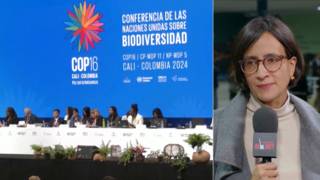
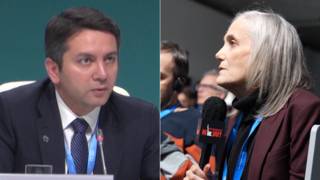
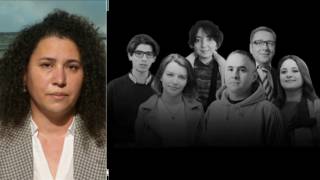
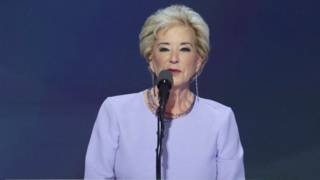





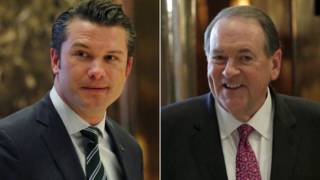
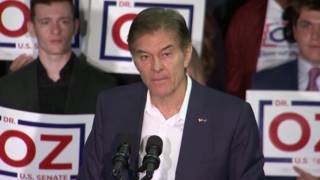
Media Options